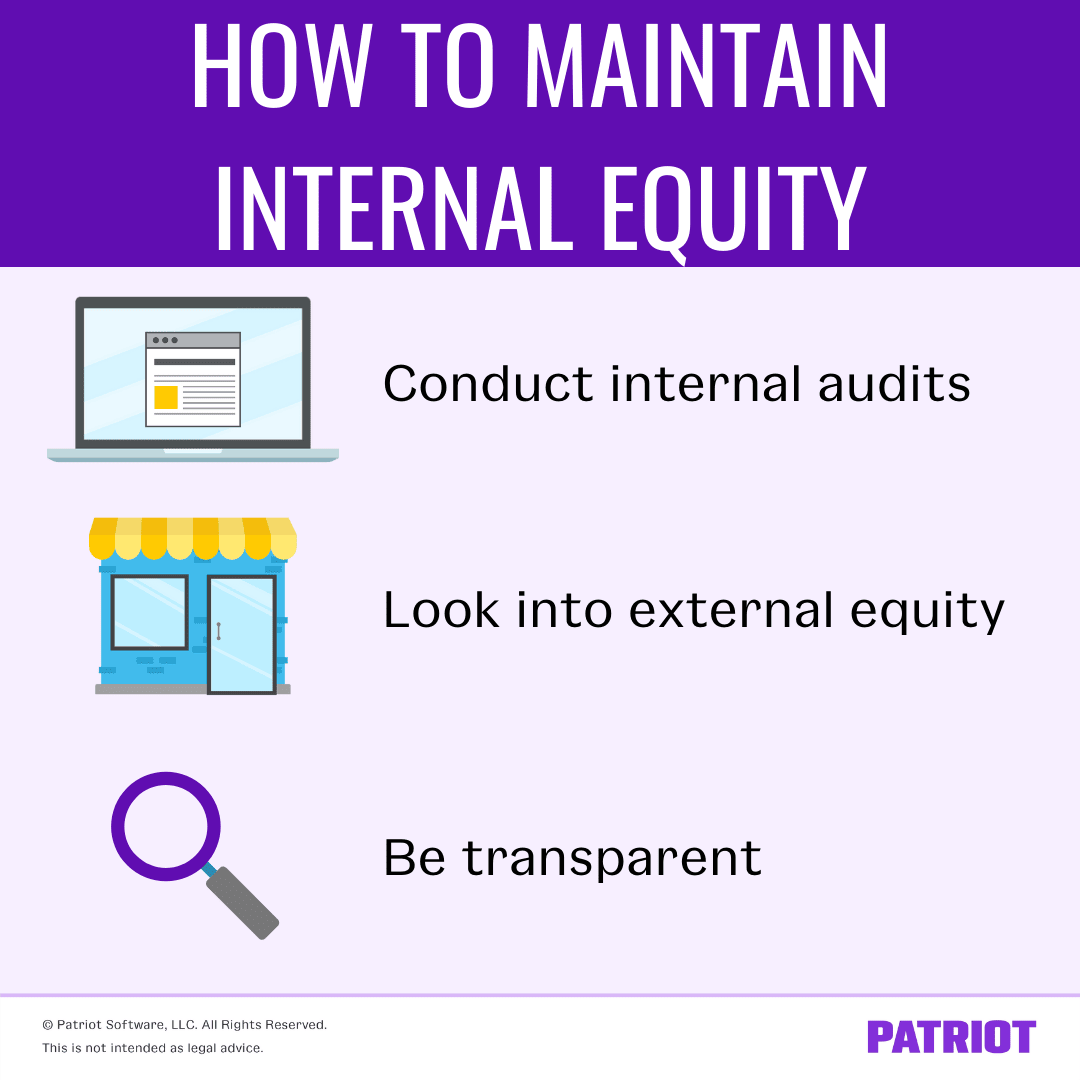When it comes to your business, one of your goals is likely to attract and retain top talent. One way you can do this is by looking at your internal equity. But, what is internal equity? And, what does it have to do with equal pay?
What is internal equity compensation?
Internal equity boils down to equal pay. With internal pay equity, employees with similar job positions or skills receive similar compensation. Equal pay can be in the form of salary or even additional benefits of the position.
As an employer, you are legally required to treat all of your employees equally and fairly based on The Equal Pay Act of 1963. The act made it illegal to pay men and women working in the same business different salaries for similar work or responsibilities. And, the act also comes into play with other forms of compensation and benefits, like a bonus.
Some states, like California, may have additional and stricter laws about equal wages. To ensure you’re compliant, check with your state to see if they have any additional requirements.
You must ensure fair pay as a business owner. However you decide to compensate for similar roles, you must pay all employees on the same level equally.
Whether or not you pay employees the same can vary based on the scenario. For example, if you have two employees with the same role but one of the workers has additional schooling specific for the job, you may decide to pay them a higher salary.
You can do an internal pay equity analysis by reviewing job position details and pay rates (which we’ll get into later).
Internal equity vs. external equity
While internal equity looks at fairness within the company, external equity looks at how your pay and benefits stack up compared to others in the industry.
External equity compares pay in your business against the external market. With external equity, you can see what the external market is paying for similar jobs within your industry. For example, you can look at external equity to see what your company is willing to pay versus one of your competitors.
Looking at external equity can help you make more competitive job offers, salary structures, and salary adjustments. Not to mention, it can help you attract and retain top talent.
You should look at both internal and external equity factors. That way, you can implement a solid compensation strategy and ensure your pay is fair and equal for each and every employee.
Internal equity example
Let’s say you own a bakery and have two decorators. The decorators both perform the exact same tasks, have the same responsibilities, and work the same amount of hours each week. Because the decorators have similar positions and tasks, you should pay them similar wages.
Now, let’s say one of the decorators goes to school to take advanced baking and decorating courses. Because the decorator’s skillset is more advanced than the other decorator, you can justify paying them a higher wage.
Importance of internal equity
Internal equity compensation is important for a number of reasons. Obviously, you have to offer equal and fair pay for all employees by law. But, there are a few additional perks. Internal equity can:
- Make employees feel valued
- Boost employee morale
- Increase employee loyalty
- Attract top talent
- Reduce employee turnover
In short, internal equity is a must for employee engagement and retention. But, it’s absolutely necessary to ensure employees are treated fairly, stay compliant with the law, and avoid any discrimination lawsuits.
Creating fair pay in the workplace
To ensure you’re fairly and equally paying each of your employees, you can take a few steps to achieve and maintain internal equity. Follow these three steps on a regular basis (e.g., annually) to make sure you’re compliant.

1. Conduct internal audits
One of the best ways you can create equal pay in the workplace is by conducting an internal audit. That way, you can see what you’re currently paying each employee and do comparisons to ensure everything is fair and equal.
During your audit, you can compare the following across each role, department, etc.:
- Job titles and descriptions
- Employee wages
- Other compensation
- Non-monetary benefits
- Level of education, skills, and experience
If there are any employees who have varying pay with a similar role to another employee, you should be able to explain your decisions on employees’ compensation. When you set an employee’s wages, document all the factors that led you to your decision.
If you notice any discrepancies while conducting your audit, take notes and make adjustments if necessary.
On the importance of conducting audits for internal equity, Roy Morejon, President and Co-founder of Enventys Partners, said:
Internal equity is about fair compensation within any specific workplace, and the best way to maintain it is to invest in regularly auditing your compensation structures. Internal audits help to compare how different employees are being compensated for various roles, which is the best way to ensure there aren’t any discrepancies in wages or other benefits for workers with similar responsibilities.
2. Look into external equity
Remember our discussion about external equity? That’s right—you’re going to use that to your advantage to ensure you’re offering equal pay.
To create fair pay in your workplace, look into external equity. Research what other companies pay for the same or similar positions. You can use tools, like PayScale, to help do your external equity analysis and get insight on average pay of certain positions in specific areas.
If you see any big differences when it comes to pay ranges while conducting your research, consider making adjustments.
3. Be transparent
Employers cannot forbid employees (verbally or in a policy) from discussing pay or other job conditions among themselves. Because of this, employees may potentially discuss their pay with one another.
To prevent any disputes or conflicts in the workplace, be transparent with employees about their pay. Let each employee know how you determined their pay with internal and external data and processes. If an employee ever questions their wages, you can explain the exact reasons for choosing their wage amount (and be sure to document it, too).
The more open you are about pay, the better off your business will be.
This article has been updated from its original publication date of July 31, 2012.
This is not intended as legal advice; for more information, please click here.







